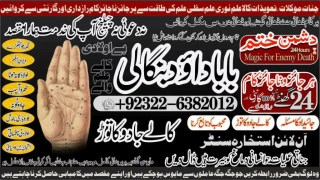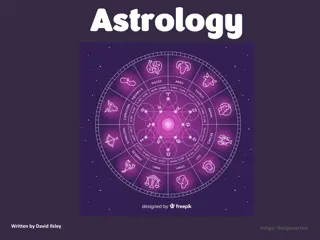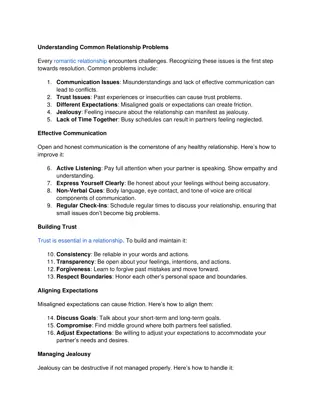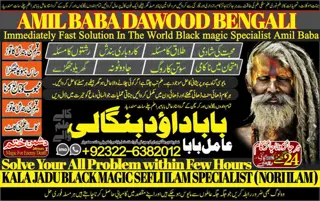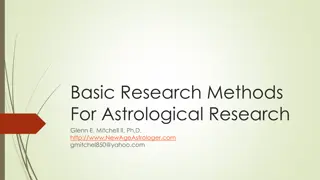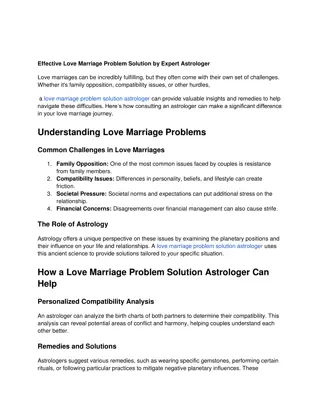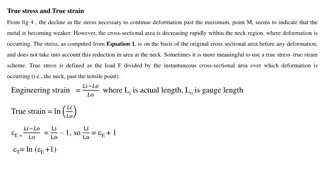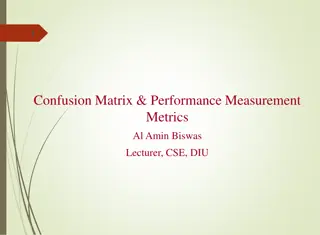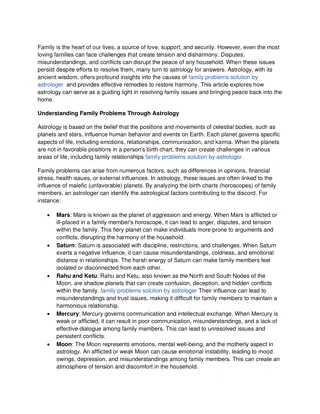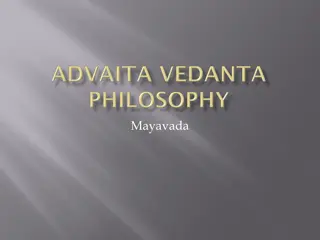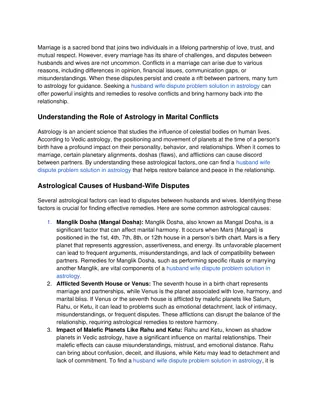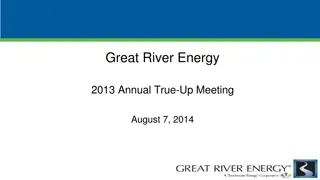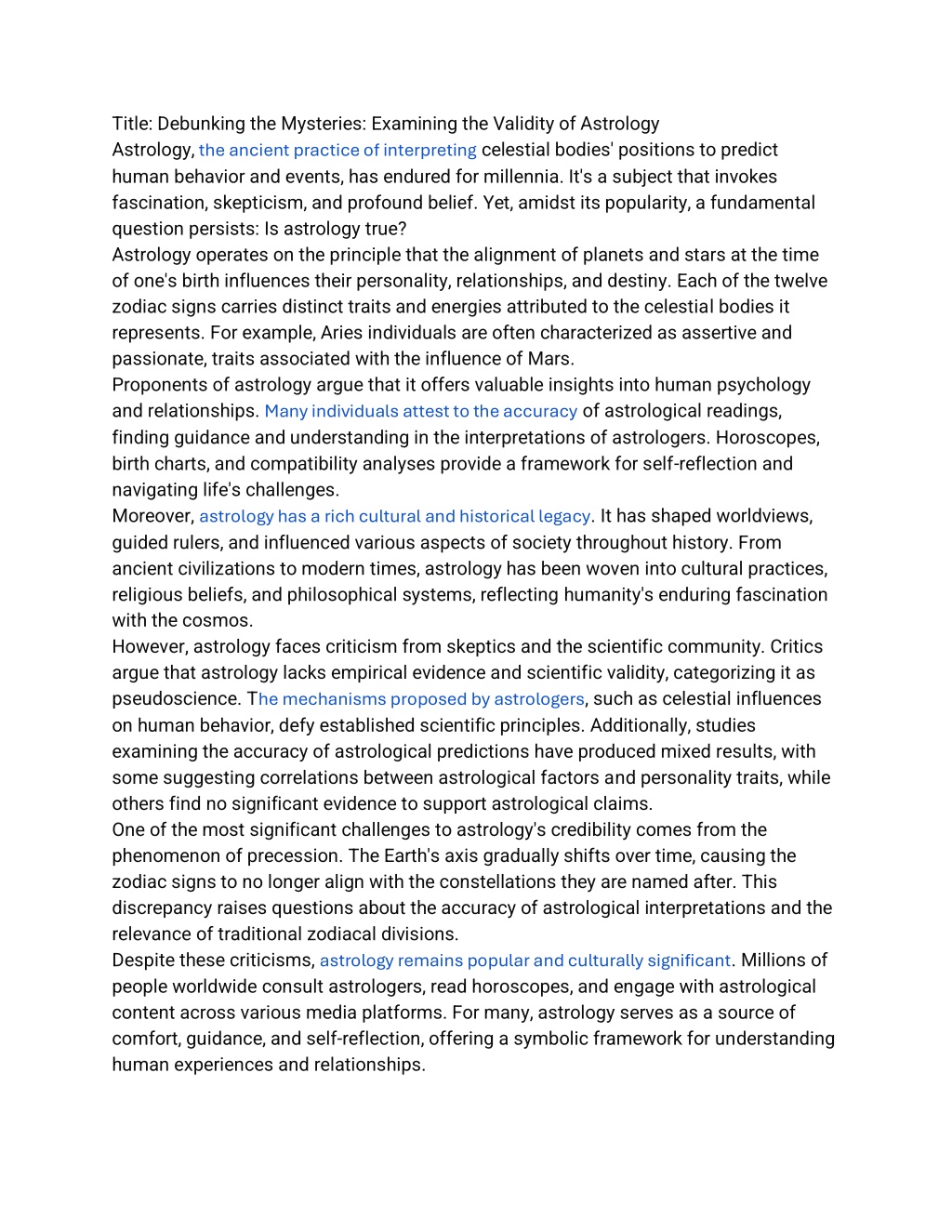
its astrology true
Astrology links celestial bodies with events on Earth. It is often used to predict future events, understand personality traits, and provide guidance in decision-making. While some people swear by astrology and believe it to be a valuable tool, others dismiss it as pseudoscience with no basis in reality. In this essay, we will explore the origins of astrology, the scientific criticisms against it, and the reasons why some people continue to find value in this ancient practice. Is astrology true?
Download Presentation

Please find below an Image/Link to download the presentation.
The content on the website is provided AS IS for your information and personal use only. It may not be sold, licensed, or shared on other websites without obtaining consent from the author. If you encounter any issues during the download, it is possible that the publisher has removed the file from their server.
You are allowed to download the files provided on this website for personal or commercial use, subject to the condition that they are used lawfully. All files are the property of their respective owners.
The content on the website is provided AS IS for your information and personal use only. It may not be sold, licensed, or shared on other websites without obtaining consent from the author.
E N D
Presentation Transcript
Title: Debunking the Mysteries: Examining the Validity of Astrology Astrology, the ancient practice of interpreting celestial bodies' positions to predict human behavior and events, has endured for millennia. It's a subject that invokes fascination, skepticism, and profound belief. Yet, amidst its popularity, a fundamental question persists: Is astrology true? Astrology operates on the principle that the alignment of planets and stars at the time of one's birth influences their personality, relationships, and destiny. Each of the twelve zodiac signs carries distinct traits and energies attributed to the celestial bodies it represents. For example, Aries individuals are often characterized as assertive and passionate, traits associated with the influence of Mars. Proponents of astrology argue that it offers valuable insights into human psychology and relationships. Many individuals attest to the accuracy of astrological readings, finding guidance and understanding in the interpretations of astrologers. Horoscopes, birth charts, and compatibility analyses provide a framework for self-reflection and navigating life's challenges. Moreover, astrology has a rich cultural and historical legacy. It has shaped worldviews, guided rulers, and influenced various aspects of society throughout history. From ancient civilizations to modern times, astrology has been woven into cultural practices, religious beliefs, and philosophical systems, reflecting humanity's enduring fascination with the cosmos. However, astrology faces criticism from skeptics and the scientific community. Critics argue that astrology lacks empirical evidence and scientific validity, categorizing it as pseudoscience. The mechanisms proposed by astrologers, such as celestial influences on human behavior, defy established scientific principles. Additionally, studies examining the accuracy of astrological predictions have produced mixed results, with some suggesting correlations between astrological factors and personality traits, while others find no significant evidence to support astrological claims. One of the most significant challenges to astrology's credibility comes from the phenomenon of precession. The Earth's axis gradually shifts over time, causing the zodiac signs to no longer align with the constellations they are named after. This discrepancy raises questions about the accuracy of astrological interpretations and the relevance of traditional zodiacal divisions. Despite these criticisms, astrology remains popular and culturally significant. Millions of people worldwide consult astrologers, read horoscopes, and engage with astrological content across various media platforms. For many, astrology serves as a source of comfort, guidance, and self-reflection, offering a symbolic framework for understanding human experiences and relationships.
The appeal of astrology lies not only in its purported predictive capabilities but also in its symbolic value and narrative richness. Astrology provides a language of symbols and archetypes that resonate with individuals seeking meaning and connection in a complex world. By exploring the interplay between celestial bodies and human experiences, astrology offers insights into the patterns and rhythms of existence. In conclusion, the question of whether astrology is true is complex and subjective. While astrology holds cultural and personal significance for many individuals, its validity as a predictive science remains contentious. Belief in astrology often depends on personal experiences, cultural influences, and individual interpretations of the cosmos. Ultimately, astrology's truth may lie in its ability to inspire wonder, introspection, and a deeper appreciation for the mysteries of the universe.

